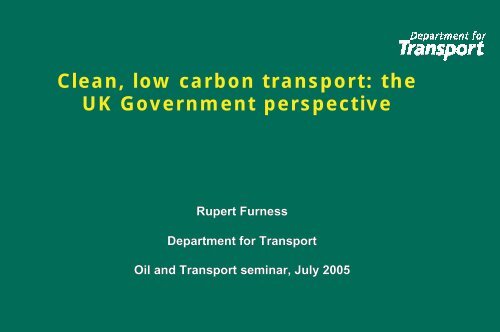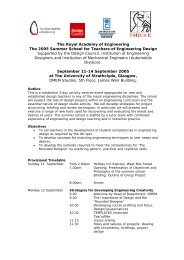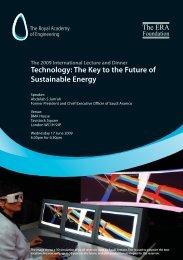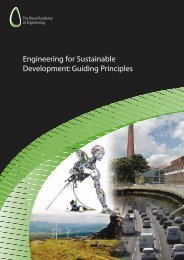Rupert Furness
Rupert Furness
Rupert Furness
You also want an ePaper? Increase the reach of your titles
YUMPU automatically turns print PDFs into web optimized ePapers that Google loves.
Clean, low carbon transport: the<br />
UK Government perspective<br />
<strong>Rupert</strong> <strong>Furness</strong><br />
Department for Transport<br />
Oil and Transport seminar, July 2005
Introduction<br />
• Transport central to UK<br />
economic success and<br />
personal freedom, but a<br />
major contributor to climate<br />
change and air pollution.<br />
• The challenge, as set out in<br />
the July 2004 Transport<br />
White Paper, is “to balance<br />
the increasing demand for<br />
travel against our goal of<br />
protecting the environment”.
Why does it matter?<br />
• Reducing impact on climate<br />
change. Transport currently<br />
accounts for 25% or so of total UK<br />
CO2 emissions - road transport<br />
alone about 20%. Emissions of<br />
CO2 from transport sector rising –<br />
by 10% from 1990-2000, and likely<br />
to rise by another 10% or so<br />
between 2000 and 2010.
Why does it matter?<br />
• Reducing impact of transport<br />
on air pollution. Road<br />
transport responsible for<br />
majority of air pollution<br />
problems in UK city centres.<br />
• And other environmental and<br />
social impacts of road<br />
transport
Clean, low carbon transport<br />
• Government aims to promote a shift towards clean, low<br />
carbon road transport:<br />
> Clean - ie low emissions of harmful air pollutants<br />
> Low carbon - ie using as little fuel as possible
How do we get there?<br />
• Improving the environmental performance of vehicles –<br />
and getting people to buy them!<br />
• Promoting the use of clean, low carbon fuels<br />
• Other policies also critically important – reducing need<br />
to travel, encouraging people to use alternatives to the<br />
car etc – but outside scope of today’s talk.
Key Government policies - 1<br />
• Supportive vehicle tax regimes - eg, the UK’s CO 2 -<br />
linked Vehicle Excise Duty…<br />
Figure 1: Graduated Vehicle Excise Duty Classification for Petrol Cars*<br />
18 0<br />
170<br />
16 0<br />
150<br />
14 0<br />
13 0<br />
12 0<br />
110<br />
10 0<br />
90<br />
80<br />
70<br />
60<br />
50<br />
40<br />
30<br />
20<br />
10<br />
0<br />
A<br />
Upto 100<br />
B<br />
10 1 to 120<br />
C<br />
121-150<br />
D<br />
151-165<br />
E<br />
166-185<br />
F<br />
Over 185<br />
70<br />
80<br />
90<br />
100<br />
110<br />
120<br />
130<br />
140<br />
150<br />
160<br />
170<br />
180<br />
190<br />
200<br />
210<br />
220<br />
CO2 g/km<br />
*For Diesel fuelled cars, add £10 t o t ax in Band A t o E, and £5 t o Band F.<br />
For Alternat ively f uelled cars, minus £10 f rom t ax in Band B t o E, and £5 f rom Band F.
Figure 2: Company Car Tax by CO2 emissions for Petrol Cars*<br />
40<br />
35<br />
% of Car price taxed<br />
30<br />
25<br />
20<br />
15<br />
10<br />
100<br />
110<br />
120<br />
130<br />
140<br />
150<br />
160<br />
170<br />
180<br />
190<br />
200<br />
210<br />
220<br />
230<br />
240<br />
250<br />
260<br />
270<br />
280<br />
290<br />
300<br />
*Add 3% if car runs solely<br />
on diesel to a maximum<br />
of 35%<br />
CO2 g/km<br />
Company Car tax 2002/03 Company Car tax 2003/04<br />
Company Car Tax 2004/05 Company Car Tax 2005/6<br />
• … and Company Car Tax regimes
Key Government policies - 2<br />
• Supportive fuel tax regimes - eg, the UK’s reduced<br />
rates for alternative fuels including LPG, CNG,<br />
biofuels. Rationale set out in Alternative Fuels<br />
Framework, published in 2003 pre-Budget Report<br />
• Research, development and demonstration<br />
programmes<br />
• Setting targets to guide long term policy direction…
• ..including the target in 2002<br />
Powering Future Vehicles<br />
Strategy that by 2012, 10% of<br />
all new cars sold will have<br />
CO2 emissions of less than<br />
100 g/km
• …and our target that by the<br />
end of 2005 0.3% of total<br />
road transport fuel sales will<br />
be from biofuels. Intending to<br />
set a 2010 target shortly.
Key Government policies - 3<br />
• Consumer information – new<br />
car A-G labelling<br />
• Grants to support take-up of<br />
new low-carbon vehicles<br />
• Government procurement of<br />
clean, low carbon vehicles<br />
and fuels
Environmental performance of<br />
vehicles - 1<br />
• Good progress made on emissions of air pollutants from<br />
road transport.<br />
• Total emissions of NOx and PM 10 from road transport have<br />
fallen by more than 50% since 1990 despite traffic growth.<br />
Likely to reduce by a further 20% or so by 2010.<br />
• Further, tighter Euro standards will deliver further<br />
reductions, especially for diesel vehicles.<br />
• But still likely to be air pollution “hotspots”.
Environmental performance of<br />
vehicles - 2<br />
• Some progress made on average new car CO2<br />
emissions - largely as a result of the Voluntary<br />
Agreements between the EU and automotive industry.<br />
• Average new car fuel efficiency has improved by about<br />
10% since 1995, delivering significant carbon savings.<br />
• Progress has slowed somewhat in recent years as a<br />
result of people’s tendency to choose larger vehicles.
Average new car CO2 emissions, EU<br />
and UK, 1995 - 2002<br />
New Car Average CO 2<br />
g/km<br />
195<br />
190<br />
185<br />
180<br />
175<br />
170<br />
165<br />
160<br />
155<br />
150<br />
1995 1996 1997 1998 1999 2000 2001 2002 2003 2004<br />
UK<br />
EU
Promoting use of clean, low carbon<br />
fuels<br />
• Huge improvements to petrol<br />
and diesel specifications –<br />
low sulphur forms have been<br />
mainstream fuels in UK for<br />
several years, ahead of EU<br />
deadline.<br />
• Government has also<br />
supported clean, “alternative”<br />
fuels, as set out in<br />
“alternative fuels framework”<br />
in 2003 Pre-Budget Report
Biofuels<br />
• UK positive about biofuels as<br />
a way of delivering carbon<br />
savings from road transport,<br />
with other benefits too.<br />
• Currently well on track to<br />
meet biofuels sales target of<br />
0.3% of total fuel sales by<br />
end of 2005.
Today’s biofuels (cont)<br />
• Main support to date through<br />
fuel duty incentives (c.30<br />
eurocents per litre).<br />
• Currently investigating<br />
feasibility of an Obligation to<br />
require fuel suppliers to sell a<br />
certain percentage of biofuels<br />
and/or other renewable<br />
transport fuels.
Challenges<br />
• Further reducing emissions of air pollutants through:<br />
› further fuel and vehicle standards<br />
› targeted local measures - including congestion charging,<br />
low emission zones, use of low or zero emission vehicles<br />
• And, arguably the far greater challenge, reducing<br />
emissions of carbon dioxide from road transport
Challenges (cont)<br />
• Reviews of UK Climate Change Programme and UK Air<br />
Quality Strategy underway.<br />
• Both are considering the scope for further policy measures<br />
to reduce emissions from all sectors, including the transport<br />
sector.<br />
• No easy solutions!
In the longer term<br />
• To reduce total CO2<br />
emissions from transport to<br />
very low levels, will need to<br />
move to low carbon fuels.<br />
• Advanced biofuels and<br />
renewably produced<br />
hydrogen look the most<br />
promising options.<br />
• But real uncertainties over<br />
cost and technologies.
Road pricing<br />
• Alistair Darling has announced that the Government is<br />
looking further at possibility of moving (in the longer term)<br />
to a national road pricing system.<br />
• The impact on carbon and other emissions would depend<br />
fundamentally on what type of scheme were to be adopted.<br />
In his speech, he made clear that:<br />
“For any road pricing scheme developed, we would ensure<br />
that incentives for cleaner vehicles are safeguarded in<br />
order to contribute to meeting our environmental targets”.
Conclusions<br />
• Have made progress in reducing impact of transport on the<br />
environment, but lots more to do.<br />
• Main challenge in future likely to be reducing transport’s<br />
impact on climate change - both by improving vehicle<br />
efficiency and by reducing the amount of carbon in the fuel.<br />
• New measures may be included in revised Climate Change<br />
Programme and Air Quality Strategy later this year.
















